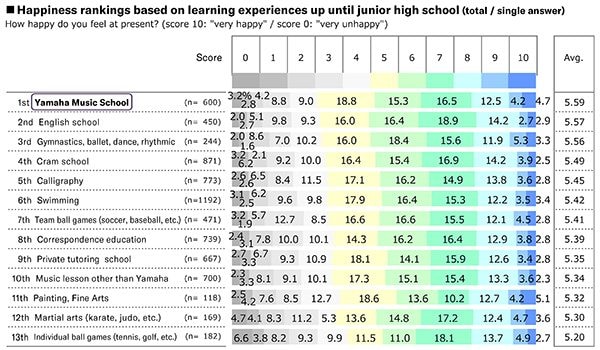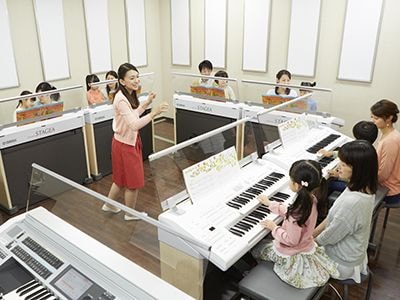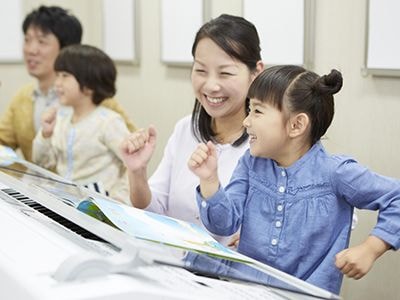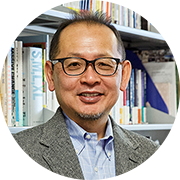How does music-related learning affect happiness?
According to a large-scale survey conducted in Japan in 2016, adults who learned music as children felt a higher degree of happiness than those who studied other topics. How do childhood music lessons affect happiness? To get some answers, we spoke to Keio University Graduate School Professor Takashi Maeno.
Many Yamaha graduates feel happiness in their current lives
──Can you tell us more about this survey from 2016?
Prof. Maeno: The survey, conducted jointly by Keio University’s Graduate School of System Design and Management and the Yamaha Music Foundation, targeted 2,700 male and female working professionals between the ages of 25 and 34. Participants were surveyed on three main themes: Are you happy? Are you satisfied with your life? Are you adapting to a globally connected world?
──Yamaha Music School ranked #1 based on students’ learning experiences.

Prof. Maeno: Yes, when we looked at happiness rankings based on learning experiences up until junior high school, those who attended Yamaha Music School ranked number one.* I also attended Yamaha Music School as a child, and I was pleasantly surprised by these results.
──You specialize in the study of happiness. What kind of academic field is that?
Prof. Maeno: It is a discipline in which we ask questions about happiness, process the results statistically, study “what kinds of people are happy,” and then try to put our findings to practical use. Overseas, it is often called happiness study or well-being study. As more and more people are focusing on abundance of the mind rather than material abundance, research in this field is being actively conducted all over the world.
──What do you mean by putting happiness research to practical use?
Prof. Maeno: It can be applied in any field—management, services, manufacturing, or housing. Application in the field of management is summarized in my book Happy Workplace Management – Creating Irresistible Teams (Shogakukan Inc. | Japan).
──You mentioned questions about happiness. Can you tell us more about the content of these questions?
Prof. Maeno: They are questions that participants answer subjectively on a scale of 0 to 10, aiming to measure “how happy you are now.” The final product is, so to speak, a happiness report card based on self-evaluation.
On the other hand, there are indicators such as good grades, an abundance of friends, and high income which are considered objective markers. However, money does not always make people happy. Conducting happiness research based on subjective surveys is the mainstream of happiness studies internationally. By using statistical methods, it has become possible to quantify scientifically levels of happiness.
──What other questions do you use other than “Are you happy?”
Prof. Maeno: There are questions that measure life satisfaction such as “Are you satisfied with your life?” Happiness and life satisfaction are also indices used in the Japanese government’s National Survey of Lifestyle Preferences. The average score in both categories was higher for those who had experienced music studies than for those who had not.
*As stated in the report on survey results, these rankings do not consider confounding factors, and therefore it cannot be said that each type of lesson alone accounts for a difference. People taking other types of lessons are also likely to increase their happiness levels. The results of this survey do not mean that only music-related lessons can make one happier.
Improving cooperation and communication skills through group lessons
──Why do you think adults who attended Yamaha Music School as children feel happy?

Prof. Maeno: I also attended Yamaha Music School as a child. I remember when I had just started, I tried very hard to just play “do-do-do, do-do-do” with one finger. A more advanced student next to me began playing a melody that was in sync with my simple notes. I felt very moved.
──So you created an ensemble where you played the same song with other students?
Prof. Maeno: The act of playing one song together is actually very simple. However, there are some truly immeasurable gains that are discovered when playing a song together to the very end.
Traditional piano lessons focus on developing individual skills. But at Yamaha Music School, Group Lessons are the standard. Through these lessons, students not only learn to collaborate, but they also learn the joy of playing music for others and the fun that comes with developing close relationships.
──I was also surprised to learn that, among third-year junior high school students, those with music study experience also perform better academically than those without such experience.
Prof. Maeno: There is a long-standing theory that learning music has a correlation with academic performance. It is possible that children with good grades tend to learn music, but it is also possible that learning music helps students acquire a learning mindset.
──The basic elements of a learning mindset are incorporated into the lessons at the Yamaha Music School.
Prof. Maeno: One hypothesis proposes that music encapsulates only the emotional aspect of playing a melody with feeling, but also the theoretical and mathematical aspect of thinking with reason and logic. I think one merit of music is that one can acquire logicality through a bodily experience.
──Cultivating sentiment together with logic and mathematical skills, is that right?
Prof. Maeno: Yes. And by practicing repeatedly, one can also cultivate a certain tenacity that comes with acquiring skills, not to mention the collaborative skills that come when developing relationships with teachers and friends in group lessons!
I remember being frustrated because I couldn’t play well, so cried while I practiced (laughs). This tenacity is surely being put to good use in my current job.
The ability to adapt to a globally connected world
──Can you tell us about the specific factors that make people happy?

Prof. Maeno: Research to date has shown that there are four main factors.
Factor 1 “Let’s try it!” (self-realization and growth)
People whose happiness increases when they have goals and dreams which they strive to achieve and gain strengths.
Factor 2 “Thank you!” (connection and gratitude)
People who are grateful, altruistic, kind, have a large, diverse group of friends, and have a frequent contact with these friends.
Factor 3 “It will turn out all right!” (positive and optimistic)
People who believe what will be will be, and who do not worry about details.
Factor 4 “Be yourself” (independence and “my pace”)
People with a well-established concept of self who do not care about what others think of them, do not compare themselves to others, and are content with being themselves.
──Did you investigate types of study other than music?
Prof. Maeno: Yes, we investigated various activities such as swimming, soccer, English language classes, and cram schools. Among music lessons, participants at Yamaha Music School had a higher degree of happiness than individual piano class participants. We discovered that the “thank you” and “let’s try it” factors were particularly high among Yamaha Music Schools students.
──In addition to happiness, you are also investigating how well people are adapting to the globally connected world, is that correct?
Prof. Maeno: That is correct. We call it diversity adaptability. This index measures whether people can interact with diverse human beings as the globally networked world progresses. We measure this using the Scale of Diversity Adaptability developed by the Graduate School of System Design and Management at Keio University.
──How do you measure diversity adaptability?
Prof. Maeno: We do this using eight factors—personality, ambition, bird’s-eye-view force, creativity, altruistic spirit, resilience, trust relationship building force, and communication. These eight factors measure a person’s ability to demonstrate their individuality and reach achievements in an environment where people from diverse backgrounds gather. The survey results showed that those who learned music as children scored above average in seven of the eight factors.
──What kinds of questions do ask regarding, for example, creativity?
Prof. Maeno: Participants rate themselves on statements such as “I often come up with new ideas that others cannot conceive,” “I have the ability to create new things by applying my ingenuity,” and “I know the importance of thinking freely without being bound by conventional values.” Again, with these questions, those with a musical past scored higher than their non-musical counterparts.
──Those with music education experience seemed to score high in terms of self-esteem. Are there any other factors where their score was high?
Prof. Maeno: They also scored well in terms of trust relationship building force. In my opinion, many sports include plenty of teamwork, but in the end, there is a winner and a loser. A musical ensemble is very harmonious. I feel that performing just one song together strengthens one’s ability to build trust among peers.
Takashi Maeno

Professor
Graduate School of System Design and Management, Keio University
Earned bachelor’s and master’s degrees in Mechanical Engineering from Tokyo Institute of Technology in 1984 and 1986, respectively, joined Canon Inc. in 1986. Visiting Industrial Fellow at University of California, Berkeley from 1990 to 1992. Earned his Doctor of Engineering degree from Tokyo Institute of Technology in 1993. Joined Keio University’s Faculty of Science and Technology in 1995 as lecturer, becoming assistant professor and then professor. Visiting professor at Harvard University in 2001. Became Graduate School of System Design and Management (SDM) professor in 2008, dean from April 2011 to September 2019.
Text: Mikako Wakiya / Photos: Naoaki Watanabe




